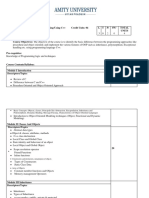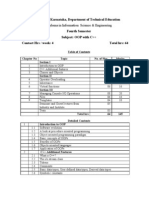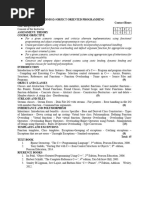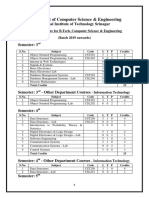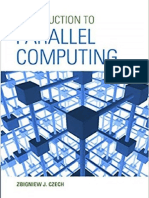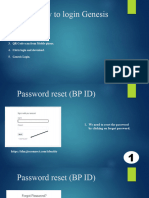Far Western University Mahendranagar, Kanchanpur: Faculty of Engineering
Uploaded by
सचिन खड्काFar Western University Mahendranagar, Kanchanpur: Faculty of Engineering
Uploaded by
सचिन खड्काFar Western University
Faculty of Engineering
Mahendranagar, Kanchanpur
Course Title: Object Oriented Programming Credit: 3
Course No: CT 123 Number of period per week: 3
Nature of the Course: Theory + Practical Total hours: 45
Year: I, Semester: II
Level: B.E.
Degree: Bachelor's Degree in Civil Engineering
1. Course Introduction
This course aims to provide the object oriented concept after the students have understood the
basic concept of programming in Basic Programming and Data Structure. This course will help
the students to enhance their programming skills in Object Oriented approach and its vocabulary.
The course will help the student to increase the problem solving technique and increase their
logic towards the programming. C++ programming language is taught in this course as an Object
Oriented Programming Language. The course starts with the basic introduction of OOP to the
different features of the object oriented programming.
2. Objectives
After successfully completing the course activities, the student will be able to:
Get the concept of Object and Classes.
Know the difference between the OOP and Procedural Programming language.
To present the syntax and semantics of the “C++” language as well as basic data types
offered by the language
To discuss the principles of the object-oriented model and its implementation in the “C++”
language
Know how to program in the actual scenario.
Understand the importance of programming in engineering field.
Learn to handle the different functionalities of OOP like friend function, inheritance,
polymorphism, etc.
Learn how to do file handling using the output stream objects
3. Specific Objectives and Contents
Specific Objectives Contents
To understand the basic concept Unit I: Introduction to Object Oriented Programming
of Object Oriented Programming (5hrs)
Language and C++. Introduction, Issues with Procedural Programming
Language, Procedure Oriented Language versus Object
Oriented Programming, Concept of OOP ( Object, Class,
Abstraction, Encapsulation, Inheritance, Polymorphism),
Advantages and Disadvantages of OOP, Introduction to C++,
History of C++, Features of C++, C++ versus C
To be familiar with the C++ Unit II: Basics of C++ (7 hrs)
program structure and basic C++ Program Structure, Keywords, Identifiers, Literals,
program constructs. Operators and Punctuators, Statements, Data Type, Type
Conversion, Namespace, User Defined Constant const,
Input/Output Streams, Dynamic Memory Allocation using
new and delete, Functions( function syntax, function
overloading, inline function, pass by reference, return by
reference), Array, Pointer, String.
To be familiar with the concept of Unit III Concept of Object and Classes (7 hrs)
Object and Classes. Concept of class, access specifiers, Objects and member
access, defining member function, constructor ( default,
parameterized and copy constructor ), Destructors, array of
objects, object as function arguments and returning objects,
this pointer, DMA for objects and object array, static data
member and static function, constant member function and
constant objects, friend function and friend classes
To be able to do simple program Unit IV Operator Overloading (5 hrs)
using object and classes. Binary and Unary Operators, Overloadable Operators,
Syntax and Rules of operator overloading, Unary Operator
Overloading, Binary Operator Overloading, Converting Data
Types ( basic to class, class to basic, class to another class)
To be familiar with binary and Unit V: Inheritance (6 hrs)
unary operator overloading. Base and Derived classes, protected Access Specifier,
member function overriding, forms of inheritance (sinlge,
multiple, multilevel, hierarchical, hybrid, multipath), virtual
base class. constructor and destructor invocation in single
and multiple inheritance.
To be familiar with reusing the Unit VI: Polymorphism (4 hrs)
class with Inheritance. Introduction, Virtual Function, pointer to derived class, pure
virtual functions and abstract class, static and dynamic
binding, virtual destructor
To be familiar with the virtual Unit VII: Templates and Exception Handling (5 hrs)
functions and dynamic binding. Templates, Function templates, Class templates, Exception
handling constructs (try, catch, throw), Advantage over
To learn about the generic conventional error handling.
programming and how it is
achieved using templates.
To be able to differentiate
between the conventional error
handling and error handling using
exceptions.
To be able to use stream operators Unit VIII File Handling using stream operators (4 hrs)
for file handling. File Input/Output using streams, Opening and Closing Files,
Read/write to/from file, file access pointers and their
manipulators, sequential and random access to file.
Prescribed Text
Object Oriented Programming with C++: E Balagurusamy, Tata Mc-Graw Hill Publication,
4th Edition
“ The secrets of Object Oriented Programming in C++” : Daya Sagar Baral and Diwakar
Baral, Bhudipuran Prakashan, 1st Edition
Reference
“Object Oriented Programming in C++” : Robert Lafore, Galgotia Publictions, 2010
Edition
“C++ How To Program” : Deitel and Deitel Pearson Education Inc., 5th Edition
Course Title: Object Oriented Programming Credit: 1
Nature of the Course: Practical Number of hours per week:
Year: First, Semester: Second (2 hrX3times or 3 hr x 2 times) 6
Level: BE Civil
Objectives:
By the end of the course the student should be able to:
Write simple and complex programs
Develop application programs
Know the syntax and semantics of Object Oriented Programming language (C++)
Identify and eliminate the syntax and semantic errors
Effectively use concept of Function overloading
Effectively use concept of inline function
Effectively use concept of Default arguments
Effectively use concept of Object and classes
Effectively use concept of Unary Operator Overloading
Effectively use concept of Binary Operator Overloading
Effectively use concept of Inheritance and Polymorphism
Laboratory Works:
1. Revision of C (basics, structure, union, array)
2. Function, pass by reference and return by reference.
3. Function overloading, inline function, Default arguments
4. Object and classes
5. Unary Operator Overloading (+, ++, -- )
6. Binary Operator Overloading (+, - , / )
7. Inheritance (single, multiple, virtual base class)
8. Polymorphism (program using virtual function)
9. Templates and exception handling (function template, class template and basic exception
handling)
10. File Handling (Basic file input/output using stream operators)
Books:
Object Oriented Programming with C++: E Balagurusamy, Tata Mc-Graw Hill Publication,
4th Edition
“ The secrets of Object Oriented Programming in C++” : Daya Sagar Baral and Diwakar
Baral, Bhudipuran Prakashan, 1st Edition
“Object Oriented Programming in C++” : Robert Lafore, Galgotia Publictions, 2010
Edition
“C++ How To Program” : Deitel and Deitel Pearson Education Inc., 5th Edition
You might also like
- Savitribai Phule Pune UniversityoopsyllabusNo ratings yetSavitribai Phule Pune Universityoopsyllabus4 pages
- Course Outline for Object Oriented Programming Using C++No ratings yetCourse Outline for Object Oriented Programming Using C++5 pages
- University of Central Punjab: Faculty of Information TechnologyNo ratings yetUniversity of Central Punjab: Faculty of Information Technology6 pages
- Code: MCA009D Subject: Programming in C++: Credit: 04 Course DescriptionNo ratings yetCode: MCA009D Subject: Programming in C++: Credit: 04 Course Description3 pages
- Object Oriented Programming Concepts Using CNo ratings yetObject Oriented Programming Concepts Using C2 pages
- Gujarat Technological University: Diploma in Computer Engineering Semester: 3No ratings yetGujarat Technological University: Diploma in Computer Engineering Semester: 33 pages
- Ita3001 Object-Oriented-programming Eth 1.0 37 Ita3001No ratings yetIta3001 Object-Oriented-programming Eth 1.0 37 Ita30013 pages
- IT306 - Object Oriented Programming With C++No ratings yetIT306 - Object Oriented Programming With C++3 pages
- Object-Oriented Programming Concepts & Programming (OOCP) 2620002No ratings yetObject-Oriented Programming Concepts & Programming (OOCP) 26200023 pages
- Co-Requisite: Prerequisite: Data Book / Codes/Standards Course Category Course Designed by ApprovalNo ratings yetCo-Requisite: Prerequisite: Data Book / Codes/Standards Course Category Course Designed by Approval4 pages
- Cse219 Object Oriented Paradigm and Programming Eth 1.00 Ac26No ratings yetCse219 Object Oriented Paradigm and Programming Eth 1.00 Ac262 pages
- CP202 Object Oriented Programming With C++:: CREDITS 6 (L 4, T 0, P 2)No ratings yetCP202 Object Oriented Programming With C++:: CREDITS 6 (L 4, T 0, P 2)2 pages
- Object Oriented Programming With C_Syllabus (1)No ratings yetObject Oriented Programming With C_Syllabus (1)3 pages
- 09Cs203 Programming in C++ Credits: 3:0:0 Course ObjectiveNo ratings yet09Cs203 Programming in C++ Credits: 3:0:0 Course Objective1 page
- Gujarat Technological University: B.E. Semester: IV Computer EngineeringNo ratings yetGujarat Technological University: B.E. Semester: IV Computer Engineering1 page
- Object Oriented Paradigm: C++ Programming Language by Bjarne Stroustrup, 4 EditionNo ratings yetObject Oriented Paradigm: C++ Programming Language by Bjarne Stroustrup, 4 Edition2 pages
- 3Ee4A: Object Oriented Programming in C ++No ratings yet3Ee4A: Object Oriented Programming in C ++2 pages
- Analysis and Design of Seismic Resistant Commercial BuildingNo ratings yetAnalysis and Design of Seismic Resistant Commercial Building1 page
- VII or VIII Semester Highway Design in Hilly Terrain (Electives)No ratings yetVII or VIII Semester Highway Design in Hilly Terrain (Electives)4 pages
- Far Western University Faculty of Engineering: Specific Objectives Unit I: ElasticityNo ratings yetFar Western University Faculty of Engineering: Specific Objectives Unit I: Elasticity5 pages
- Definition of A GIS Features and FunctionsNo ratings yetDefinition of A GIS Features and Functions4 pages
- Far Western University Faculty of Engineering Bachelor of Engineering (Civil) Course of StudyNo ratings yetFar Western University Faculty of Engineering Bachelor of Engineering (Civil) Course of Study3 pages
- VII Semester Const MGMT and Project EngineeringNo ratings yetVII Semester Const MGMT and Project Engineering2 pages
- Far Western University Faculty of Engineering Bachelor of Engineering (Civil) Course of StudyNo ratings yetFar Western University Faculty of Engineering Bachelor of Engineering (Civil) Course of Study3 pages
- Far Western University Faculty of Engineering Bachelor of Engineering (Civil) Course of StudyNo ratings yetFar Western University Faculty of Engineering Bachelor of Engineering (Civil) Course of Study4 pages
- A Complete Manual of Safety Engineering (Seventh Semester)No ratings yetA Complete Manual of Safety Engineering (Seventh Semester)146 pages
- Far Western University Faculty of Engineering Bachelor of Engineering (Civil) Course of StudyNo ratings yetFar Western University Faculty of Engineering Bachelor of Engineering (Civil) Course of Study4 pages
- Javascript Error - Not Updating Hierarchy of Public Dimension - SAP CommunityNo ratings yetJavascript Error - Not Updating Hierarchy of Public Dimension - SAP Community4 pages
- Openscape Business v2 Administrator Documentation Issue 16No ratings yetOpenscape Business v2 Administrator Documentation Issue 161,675 pages
- 695507748-Data-communication-and-computer-network-ITec2102-Model-Exam-QuestionsNo ratings yet695507748-Data-communication-and-computer-network-ITec2102-Model-Exam-Questions3 pages
- A Guide To Tips and Tricks For C ProgrammingNo ratings yetA Guide To Tips and Tricks For C Programming96 pages
- (Ebook) Focus On SDL (The Premier Press Game Development Series) by Pazera, Ernest ISBN 9781592000302, 1592000304 - Get the ebook in PDF format for a complete experience100% (1)(Ebook) Focus On SDL (The Premier Press Game Development Series) by Pazera, Ernest ISBN 9781592000302, 1592000304 - Get the ebook in PDF format for a complete experience56 pages
- BPK Ridho The Future of Apotek in Indonesia - Penggunaan Teknologi Untuk Mengangkat Daya Saing Apotek Mandiri Di Era Digital BPK HadiNo ratings yetBPK Ridho The Future of Apotek in Indonesia - Penggunaan Teknologi Untuk Mengangkat Daya Saing Apotek Mandiri Di Era Digital BPK Hadi40 pages
- H-Series-Video-Wall-Splicers-User-Manual-V1.12.0-2No ratings yetH-Series-Video-Wall-Splicers-User-Manual-V1.12.0-295 pages
- Motion Control NC82 Complete English 2022 01No ratings yetMotion Control NC82 Complete English 2022 01260 pages
- Save Copy of Copy of NEW ACME Network Template-New - Shortcut - LNKNo ratings yetSave Copy of Copy of NEW ACME Network Template-New - Shortcut - LNK147 pages
- 5500sc 961Xsc Service Manual v3.3 Official Version October 2019No ratings yet5500sc 961Xsc Service Manual v3.3 Official Version October 2019110 pages
- Enterprise Network Services Design (IPv6)No ratings yetEnterprise Network Services Design (IPv6)1 page
- SAP HANA On Power Level 1 Quiz - Attempt ReviewNo ratings yetSAP HANA On Power Level 1 Quiz - Attempt Review27 pages


